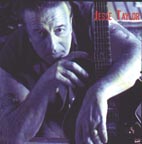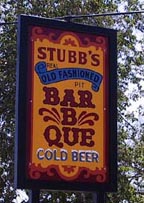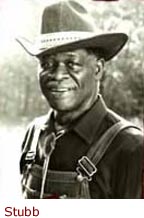Fire in the Water, Earth in the Air: Legends
of West Texas Music
by Christopher Oglesby
Published by the University
of Texas Press:
"As a whole, the interviews create
a portrait not only of Lubbock's musicians and artists, but also
of the musical community that has sustained them, including venues
such as the legendary Cotton Club and the original Stubb's Barbecue.
This kaleidoscopic portrait of the West Texas music scene gets
to the heart of what it takes to create art in an isolated, often
inhospitable environment. As Oglesby says, "Necessity is
the mother of creation. Lubbock needed beauty, poetry, humor,
and it needed to get up and shake its communal ass a bit or go
mad from loneliness and boredom; so Lubbock created the amazing
likes of Jimmie Dale Gilmore, Butch Hancock, Terry Allen, and
Joe Ely."
"Indeed, Oglesby's introduction of more
than two dozen musicians who called Lubbock home should be required
reading not only for music fans, but for Lubbock residents and
anyone thinking about moving here. On these pages, music becomes
a part of Lubbock's living history."
- William Kerns, Lubbock Avalanche Journal
|
A Brief Conversation:
Chris Oglesby &
Jesse "Guitar" Taylor
on South
Congress Avenue
Austin; 2/12/98
 Known as The Gangster of Love, Lubbock native Jesse Taylor
became internationally famous as Joe
Ely’s blistering lead guitar player. Perhaps lessser
know, Jesse Taylor was the first white man to ever play at the
legendary original Stubb’s Bar BQ in East Lubbock.
Known as The Gangster of Love, Lubbock native Jesse Taylor
became internationally famous as Joe
Ely’s blistering lead guitar player. Perhaps lessser
know, Jesse Taylor was the first white man to ever play at the
legendary original Stubb’s Bar BQ in East Lubbock.
If you've never seen Jesse Taylor play roadhouse guitar, you
have missed one of the truly visceral experiences of Texas music.
The man is Rock-n-Roll.
In the early days of my quest to write this story of Lubbock
music, one of the first artists who agreed to work with me on
by Lubbock project was Jesse "Guitar" Taylor.
When I first came up with the idea for a book about Lubbock
and it's creative offspring, I spoke to my friend John Scott
- President & co-owner of Stubb's Bar-BQ and Lived Music - about
my original ideas for seeking out the sources of Lubbock's artistic
font. John was excited about the idea and said he'd help out
any way he could. Not thirty minutes after we spoke, an excited
John Scott was calling me back. "I just talked with Jesse
Taylor and told him about your book idea. He wants you to call
him at his home right now."
Jesse definately was interested in talking I promptly called
the guitar legend at the number John relayed to me. Jesse answered
with, "It's about damn time somebody writes this book!"
I told him about being young and going with my dad to Stubb’s
on East Broadway. My
dad was the basketball recruiter at Texas Tech and friends with
Stubb, so we'd go over and have lunch with Stubb often when I
was kid. At that time, very few other white people ever made
the journey to the east side of Lubbock to visit Stubb’s.
That was until Jesse Taylor started rocking the joint with his
Sunday night jams. My
dad was the basketball recruiter at Texas Tech and friends with
Stubb, so we'd go over and have lunch with Stubb often when I
was kid. At that time, very few other white people ever made
the journey to the east side of Lubbock to visit Stubb’s.
That was until Jesse Taylor started rocking the joint with his
Sunday night jams.
Being over there with my dad and this big, black man known only
as "Stubb" - on the dark-side of one of the waspiest
white towns in America - I remember thinking, even as a youth,
"Hey there’s something cool here, and why does no
one else I know in Lubbock seem to acknowledge it?"
Jesse agreed. "Shit, sometimes I think that Lubbock will
never change." Jesse responded. "They don’t know
what genius they have from right there in Lubbock. They could
have built recording studios and turned Lubbock into the Nashville
of Texas Music but they just turn their backs."
However I was interested that he added:
"But Austin is almost the same. I mean it’s not at
all like Lubbock in that Austin is very open-minded and liberal
and all that.But even in Austin, the people here don’t have
any idea how much all us guys from Lubbock have done.
I’ll go out and tour with Bob Dylan or Bruce Springsteen,
and I’ll get back to Austin and walk down the street, and
people come up to me and say ‘Hey, Jesse, why haven’t
you been playing down at the Saxon lately?' People just don’t
know what they have here."
I was living in California at the time but was preparing to
move back to Austin, so we agreed to talk in person when I returned
to Texas.
Shortly after I got back to Austin, Jesse contacted me and
said he was playing a "pick-up" gig with some songwriter
at a little joint on South Congress called Shaggy's. He
didn't have much time for a full-length interview because of
his studio commitments - Jesse was curently cutting a record
for an Italian recording label as well as playing lead guitar
on Ely's Twisting in the Wind album being recorded then,
also - However, he'd be happy to get together during soundcheck
to discuss the book idea a little more and figure out how he
could help me in my efforts. Jesse really is one of the kindest,
most generous guys I've ever met.
It was a rainy night. Jesse was at the bar and, Man, did he look
tired. Jesse told me he had been up for about three days in the
studio. It showed; but he was smiling and laughing and ready
for more action.
Thanks to Jesse Taylor for sharing this story about the first
time he met C.B. "Stubbs" Stubblefield, the birth of
the Stubb's Bar-BQ Sunday Night Jams, and much of Lubbock's
musical heritage from the 70s.
Chris: Tell me about the first time that you met Stubb;
When Stubb picked you up hitchhiking.
Jesse: Basically, I was just livin' in Lubbock. I had
been in California awhile. Like all the other musicians fo my
era there in Lubbock, we used to go back and forth between California
and Austin and Lubbock all the time - with some diversions to
Colorado...
I was just back in Lubbock on one of those trips through there
and happened to be stayin' there at that time I was livin' on
East Broadway in Lubbock.
Stubb's was at the top of one side of the hill, the one closest
to Avenue "A"; You went down this big draw by Mackenzie
Park, and I was the top of the other side…He was on the
side closer to downtown. I was further the other way.
I used to go to my friends' house to go jam or somethin';
Go over to Ely's house or Jimmie's
house. Of course, I was a poor broke musician hippie like we
all were, I guess. So I didn't have a car or nothin'; I would
just go hitchhike.
This one day I was standin' there hitchhiking, and this big,
BIG Cadillac pulls up. I  look
in and…And it's Stubb! look
in and…And it's Stubb!
Chris: Did you know who he was when he stopped?
Jesse: Oh, no! Not at all.
But I had walked by his place quite often because I lived on
that street, and I had to walk by there all time. Every once
and a while, when I'd walk by there and people would open the
door, I'd see this smoky little bar, and I'd hear this Blues
comin' out of there...
I would think, "I wanta' go in that place so bad!"
But it was like, really…It was just pretty much all Black.
I never saw any, any White people in there, so I was a
little intimidated.
Although, as it turns out, I never should've been because they
woulda' loved it if I had just walked in the door, but…
But it was amazing. He got me up to the top of the hill there,
and he said, "Well, this is where I'm goin'." And he
started to let me off. We were there ast Stubb's.
I said, "I've walked by the place so many times. You
go in there very much?" because I wanted to know what it
was all about; And he says, "I own this place!"
I said, "Really? I've always wanted to go in there."
Stubbs said to me - his exact words - He said, "Well,
I'll tell you what, I got a barbecue sandwich and a cold beer's
got your name on it in there."
So that was the first meeting, right there.
After that, I'd go in there. We'd be sitting around listening
to the jukebox and there wasn't very much goin' on. Stubbs said,
"Y'know? What we need is some Live music here."
I knew all the musicians in town, so I said, "Let me get
on the phone. I'll bring you some Live music!"...And
that's pretty much how that deal all got started.
-end-
Return to Interviews or Home
Do you like the interviews you have been reading
on virtualubbock.com?
Buy the
book by
author Christopher Oglesby
Fire
in the Water, Earth in the Air:
Legends of West Texas Music
"As a whole, the interviews
create a portrait not only of Lubbock's musicians and artists,
but also of the musical community that has sustained them, including
venues such as the legendary Cotton Club and the original Stubb's
Barbecue. This kaleidoscopic portrait of the West Texas music
scene gets to the heart of what it takes to create art in an
isolated, often inhospitable environment. As Oglesby says, "Necessity
is the mother of creation. Lubbock needed beauty, poetry, humor,
and it needed to get up and shake its communal ass a bit or go
mad from loneliness and boredom; so Lubbock created the amazing
likes of Jimmie Dale Gilmore, Butch Hancock, Terry Allen, and
Joe Ely." - University
of Texas Press
|



